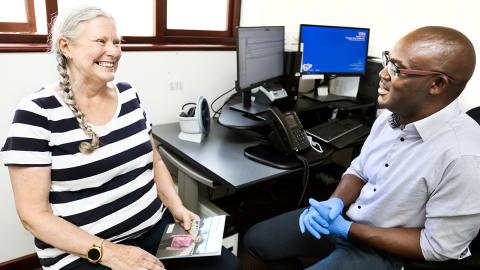This is the report outlining the findings of the third phase of the FCP National Evaluation.
Listen to Larry Koyama, head of FCP implementation at the CSP, discussing the findings of the FCP phase 3 national evaluation with guests Katherine Armitage, Simon Ingram, Rob Goodwin and Siobhan Stynes.
Background
In the UK, musculoskeletal (MSK) problems are predominantly managed in primary care, accounting for approximately 14% of General Practitioner (GP) consultations. The first contact physiotherapist (FCP) role has been introduced to streamline care for patients with MSK problems and to increase capacity within, and improve access to primary care.
What is an MSK first contact physiotherapist?
MSK FCPs are physiotherapists with advanced clinical practice skills who are able to assess, diagnose, treat and discharge patients without medical input.
Benefits of having FCPs
- Patients with MSK pain, can contact the FCP directly, rather than wait to see a GP or getting a referral to other community or hospital services. The ambition is that the whole NHS England patient population has direct access to MSK first contact physiotherapists by 2023/24, across all primary care networks.
National FCP Evaluation
- The FCP National Evaluation took place between October 2018 and March 2020. It comprised three phases. Phases 1 and 2 were led by NHS England Elective Care Transformation Programme (ECTP) with support from the Chartered Society of Physiotherapy (CSP).
Phase 1
- Phase 1 used a local context questionnaire to collect data on services’ funding, governance, staffing and care providers.
Phase 2
- Phase 2 collected FCP consultation data over 10 months using a tool embedded in the electronic health record system of FCP pilot sites.
The final report for Phase 1 and 2 can be accessed on the NHS Futures platform, within the 'Elective Care Community of Practice' workspace. You can access this platform with an NHS email address.
Phase 3
- Phase 3 consisted of a mixed-methods national evaluation of the FCP model of care. This was a collaboration between Keele University (lead) and University of Nottingham and funded and supported by the Chartered Society of Physiotherapy Charitable Trust and the Joint Work and Health Unit.
- In 2021 a continuation of the FCP phase 3 qualitative evaluation was conducted with services in Scotland and Northern Ireland by University of Nottingham on behalf of the FCP Phase 3 Evaluation team.
The overall aim of the phase 3 FCP national evaluation was to evaluate the FCP model of care against five service aims and 12 success criteria that were pre-defined from existing literature and with help from stakeholders and patients.
Process
- A mixed methods approach collected patient reported experience and outcomes data over 24 months using an online platform, from 240 FCPs in 40 services in England Qualitative data on FCP, GP, general practice non-clinical staff and patient experience was gathered through interviews and focus groups.
Participants
- FCPs registered patients to receive information about the evaluation from December 2018 to January 2019.
- a. 680 of 2825 patients registered (24%) completed the initial questionnaire
- b. Follow-up rates at 1, 2 and 3 months were 63% (n=430), 62% (n=419) and 54% (n=370)
- Participants for qualitative interviews, focus groups and observational diaries were recruited from six FCP sites in England.
- a. Of 39 participants, there were 14 patients, 11 FCPs, 8 GPs and 6 general practice non-clinical staff
Patient characteristics after initial consultation with FCP
- Mean age was 56.2, 61% were female, 97% reported their ethnicity to be white
- Average pain intensity was 6.1 (scale of 0-10)
- Average MSK-HQ score was 33.8 (range 0 to 56, higher scores mean better health)
- 47% had an MSK problem lasting for 3 months or less
- 25% had pain in >1 body region
- 49% reported ≥1 co-morbidity
Reduction in MSK following FCP care
- Follow-up response rates at 1, 2 and 3 months were 63% (n=430), 62% (n=419) and 54% (n=370) respectively.
- Global change in MSK symptoms (defined as better/much better) since patients first saw the FCP increased slightly from 58% at month 1 (n=249) to 64% (n=237) at month 3.
- There was a 2.8 (95% CI 2.5, 3.1) mean reduction in pain intensity from baseline (published MIC is 2 (26)) and a mean 7.1 (95% CI 6.0, 8.2) score improvement on the MSK-HQ (published MIC is 6).
Patient's experience
Patient acceptability of FCP was very high;
- 98% of responding patients reported having confidence in the FCP’s competency to assess their problem
- 95% reported receiving sufficient information about self-care
- 93% reported receiving sufficient information about their MSK condition
Patients reported feeling valued as individuals with respect to 'care and respect' from general practice staff and 'understanding and engagement' of their problem by the FCP.
Service aims and success criteria of FCP model
The agreed service aims and success criteria included five aims (A to E), and within each aim specific success criteria there are twelve in total.
Agreed service aims and criteria
The agreed service aims and success criteria included five aims (A to E), and within each aim specific success criteria, 12 in total.
Six of the twelve success criteria pertain to the quantitative online data collection (success criterion 1, 3, 5, 6, 8 and 9). The remaining six are addressed by the qualitative component of the evaluation (2, 4,7,10,11,12)
Aim A: FCP services should reduce the workload of GPs
- Success criterion 1: The percentage of patients consulting the FCP who report (within 3 months) visiting their GP for the same problem will be: 25% or less (fully met), 26-50% (partially met), 51% or more (not met).
- Success criterion 2: GPs discourse reflects confidence in the FCP service and competence of the FCPs.
Aim B: FCP services should provide assessment and self-management advice.
- Success criterion 3: Patients will report receiving self-management information/exercises from their FCP relating to their joint or muscle symptoms. 70% or more (fully met), 50-69% (partially met), 49% or less (not met).
- Success criterion 4: Patient discourse reflects self-efficacy and confidence in self-management techniques.
Aim C: FCP services should provide high quality care and a good patient experience to patients with MSK problems
- Success criterion 5: Patients should report improved MSK health at 3 months (as measured by achieving a minimal important change of 6 points on the MSK-HQ): 51% or more (fully met), 40-50% (partially met), 39% or less (not met).
- Success criterion 6: Patients report being ‘Likely’ or ‘Very likely’ to recommend the FCP service to friends and family. 80% or more (fully met), 60-79% (partially met), 59% or less (not met).
- Success criterion 7: Patient discourse reflects a positive experience of FCP.
Aim D: FCP services should support patients to remain in/return to work
- Success criterion 8: Patients in employment report receiving specific advice about work. 75% or over (fully met), 50-74% (partially met), 49% or less (not met).
- Success criterion 9: Patients will report less impact of their MSK condition on work performance at 3 months (as measured by the Stanford Presenteeism Scale): 51% or more report reduced impact (fully met), 40-50% (partially met), 39% or less (not met).
- Success criterion 10: Physiotherapist’s discourse reflects confidence in their competence to offer advice with regards to work related issues.
- Success criterion 11: Patient’s discourse reflects perceived benefit from the advice offered by the FCP with regards to work related issues.
Aim E: FCP services should provide staff with a positive experience
- Success criterion 12: Staff discourse reflects a positive experience of working with and in the FCP services.
Recommendations for the scalability and successful implementation of the FCP model of care.
- General practice-staff should signpost appropriate patients to the FCP; this requires investment for training or to develop agreed resources.
- Co-locate FCPs in general practice to optimise success of the FCP model.
- Greater FCP service capacity and presence leads to greater impact of the service.
- Aligning FCP and general practice IT systems is essential.
- Encourage non-IT methods of communication such as an ‘open door’ policy between clinical staff to build trust and confidence in the FCP service.
- Greater FCP capacity is required to reduce GP MSK workload. Current FCP models do not provide sufficient capacity to significantly reduce GP workload, but do positively influence GP work experience.
- Initiatives to raise public awareness and understanding of the value of the FCP role are needed.
- Prioritise collection of data to demonstrate impact of FCP. This should include patient reported clinical outcome measures.
- Some advanced practice skills in FCPs are desirable rather than essential.
Conclusion
This evaluation provides useful data on the characteristics of patients who are accessing the FCP service, their short-term clinical outcomes and experiences of FCPs, GPs, general practice non-clinical staff and patients. The results confirm that key success criteria are being met.
You can read the full Phase 3 evaluation report here.
FCP Phase 3 National Evaluation Report
FCP Phase 3 Qualitative Evaluation Scotland & NI 2022
This evaluation was conducted by Keele University and the University of Nottingham.

It was funded by the CSP Charitable Trust and Joint Work and Health Unit.




